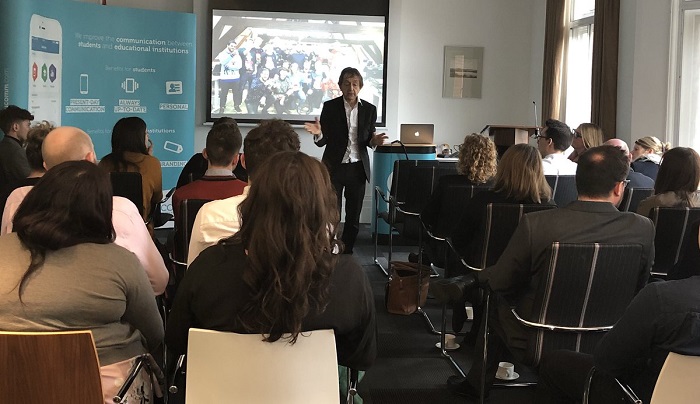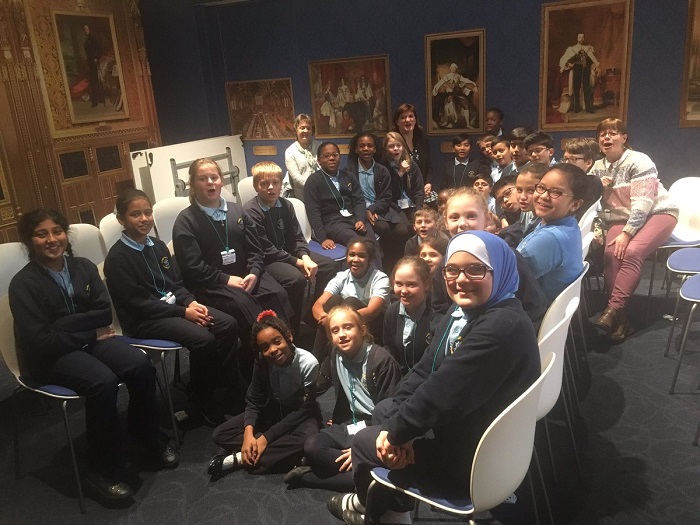Data from the NHS and the Office for National Statistics (ONS) tell us that children’s mental health is not as good as it could be in the UK. This means many children are not in the best position to adapt to the challenges life throws at them. In 2015, the OECD PISA survey measured “Fantastic people are figuratively pushing boulders up a treacly hill.”not just academic performance across key subject areas, but also student wellbeing. It is worrying to see that although the academic performance of UK students is generally above or at OECD average, and broadly comparable to that of students in countries such as Germany, Finland, Luxembourg and Switzerland, their wellbeing is significantly lower than that of students in those countries.
Something needs to change, and luckily there are some great change-makers in the UK education system.
I am lucky. My line of work means I get to meet some fantastic people that are driving educational change. This would turn into a very long article if I were to attempt to showcase every one of them, but I would like to mention a few that stand out.
Sir Anthony Seldon is one of my heroes! He introduced a wellbeing curriculum at Wellington College way back in 2006, and continues to be a strong voice for the importance of character and positive education. He is now vice-chancellor of the University of Buckingham, Europe’s first Positive University. Try to hear him speak at a conference if you can. And if you’re lucky enough to get the chance to speak to him, do! My friend and colleague Elizabeth Wright and I were honoured to have his undivided attention for 10 minutes at the 2016 IPEN Festival of Positive Education.

Sir Anthony Seldon at the Digital Student Summit (Image credit: @AnthonySeldon).
Hannah Wilson is executive headteacher of Aureus School and Aureus Primary School. The mission of both schools is to educate the whole student and allow everyone in the school community to ‘grow, learn and flourish’. Her passion for a holistic approach to education is apparent in all that she does, and meeting her will leave you bursting with excitement at everything we can all achieve if we work together towards this common goal. Do take a look at her blog; it’s brilliant! Hannah is also one of the founders of the fantastic #WomenEd grassroots movement.
Clare Erasmus is director of Mental Health & Wellbeing at Magna Carta School, where she is responsible for some fantastic initiatives. I first met her when she organised a brilliant mental health TeachMeet at her school. I am also honoured to have participated in her huge online #cultureofwellbeingDGinset online INSET event. Clare’s dedication to improving the mental health of young people and their teachers is inspiring!
Last, but by no means least, I want to mention Kate Sowter, deputy head of the Teaching School at the Pathfinder Teaching School Alliance. Kate is relentless in her pursuit of teaching excellence and innovation. She organises fantastic events including mental health conferences and ‘genius hours’, where teachers can share ideas and practical solutions to everyday teaching challenges. Her energy and enthusiasm are second-to-none, and she has a fantastic knack for bringing people together for collaborations!
I have highlighted the four people above because each of them models the great character strengths of perseverance, leadership, kindness, hope, creativity, teamwork, love of learning, and zest. They embody what it means to lead in character and positive education. Character education helps pupils develop a well-rounded character across the four key areas of moral, civic, performance and intellectual strengths. You can learn more about this from the Association for Character Education (ACE) and the Jubilee Centre for Character and Virtues. Positive education brings together academic learning, character education and wellbeing through the application of positive psychology research in educational settings. You can find out more from the International Positive Education Network (IPEN).
So, reading the above, I guess it sounds like there’s a lot of good stuff happening in education already, right? Does that much really need to change? I believe it does, as we’re only just scratching the surface.
My vision for education
I think that, whilst there are some great examples of character and positive education in schools and other educational settings, this isn’t enough. Fantastic people with great drive and ambition for the future of our children are figuratively pushing boulders up a treacly hill. Successive governments and education secretaries pay lip service to the need to focus more on pupil wellbeing and character, while nothing really changes and schools are still assessed and ranked on ever more challenging academic measures.
One exception, perhaps, is former UK education secretary Nicky Morgan MP, who I believe genuinely wants character education to play a bigger role - check out her book, Taught, not Caught. Character and positive education need to become embedded into our education system, not bolted on (I know, I know, I’m effectively advocating to do myself out of a job!), but even that isn’t enough, in my opinion. I believe that we need to completely overhaul the UK’s education system.

Nicky Morgan with the pupils and staff from St Mary's Catholic Primary School (Image credit: @NickyMorgan01).
Let’s look at Finland: They’ve got it right, both academically and in terms of pupil wellbeing. Their per student annual spend on education is lower than that of the UK, but they use it well. Compulsory education begins with ‘pre-Primary education’ at age six (until 2015, compulsory “Character and positive education need to become embedded into our education system, not bolted on.”education began after this stage, at seven)! All ‘basic education’ (seven to 16) is free-of-charge, and free school meals are provided to all pupils. Local education authorities have a lot of freedom to develop local curricula, and teachers are highly-educated and respected. Society’s attitude is very positive towards education, there are no SATs, and pupils are highly-supported in their learning and wellbeing. You can read more about what makes the Finnish system so different and worthy of closer inspection on the Ministry of Education and Culture’s website.
Why is it that, when there is so much evidence of success in a system that dares to be different, we keep doing more of the same in the UK and expecting different outcomes? Don’t get me wrong, the problems in the UK are not unique. The USA is in a similar boat, as are many other countries, but that doesn’t make it okay, does it?
What can we as individuals do, then?
We need to hone our character strengths of bravery, creativity, hope, leadership, and perseverance. We need to keep pushing for more positive and character education, keep doing research that backs up that this stuff works, keep driving the agenda. Eventually, we can create the change our children need. So let’s keep celebrating the great disruptors, because they are the pioneers, the brave ones, the ones that have a vision and the passion to keep going. And let’s be the wind beneath their wings and help them grow a bigger, stronger movement for change.
Want to receive cutting-edge insights from leading educators each week? Sign up to our Community Update and be part of the action!


















